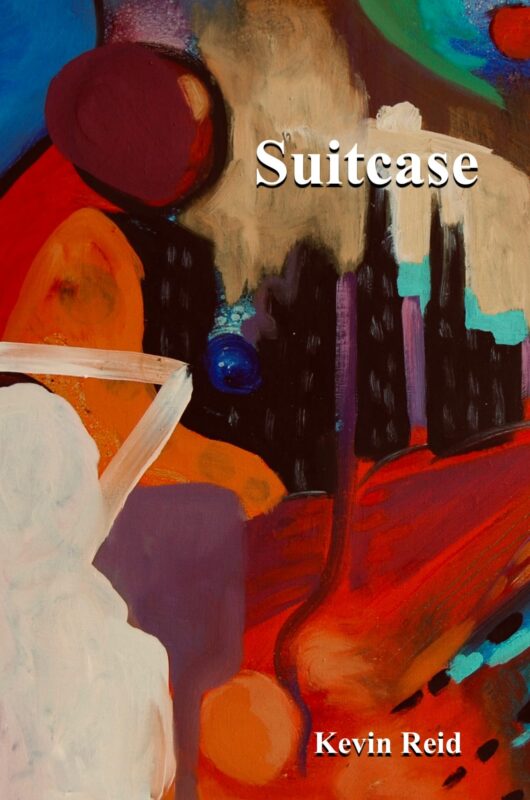REVIEW: KEVIN REID’S ‘SUITCASE’
By Stella Backhouse

During lockdown, I experienced homesickness for the first time in years. Don’t get me wrong: I was at home – what is now my home – the whole time. But I couldn’t stop thinking about the town where I grew up. The yearning to walk along certain streets became almost physical; the worry that I would never again lay eyes on certain sights at times blocked out almost everything else. When I eventually revisited, I came away with a mixture of feelings: spending time there was obviously what I needed because my anxiety disappeared overnight; but the middle-class tweeness that has these days taken over the place made me feel, as it always does, that I don’t belong there any more.
Although Kevin Reid’s story isn’t identical to mine, his 2020 collection Suitcase comes from the same irreconcilable no man’s land of longing to go back/longing to get away. ‘Small Town’, his opening poem, encapsulates the dilemma: Reid’s very identity was forged by the “room and kitchen/with an outside toilet,/a bed as big as a country, where/I first felt the tingle of my genitals”; but this is also a deeply conservative environment where “drawing and painting/don’t lead to real jobs, where/hairdressing is high art”.
Reid’s first experiments with leaving involve a complicated physically-present-mentally-elsewhere nesting that later reverses. In ‘Prayer for an Ex-Lover’, his narrative of a woman lured into one kind of escape remains rooted in the Catholicism of his youth: “Look with pity on…her junky hangout,/the foil and squalor of Callum’s flat”. ‘The Church of the Red Telephone’ box meanwhile stakes out a tiny enclave of alternative religion where “sex/could take place before marriage if/you didn’t mind shameless voyeurs”. This boxes-within-boxes imagery perhaps explains his plea in ‘For Now’ to “know me/like a Russian doll”.
The moment when Reid’s physically-present-mentally-elsewhere mindset abruptly flips is at the death of his mother. He wasn’t there. Instead, he was “on the other side/of the country at an arts festival/giving an artist’s talk/being a fuckin’ artist”. The consequences of the choices he has made are borne crushingly upon him, but for all his self-laceration about “being a fuckin’ artist”, he has still dealt with it by hiving his emotions within the artistic frame of poetry. Indeed, in what follows, much of which is about grief, the printed page perhaps acts as a bolt-hole where different realities can reassuringly co-exist.
Because what I often sensed in this collection was the classic artistic insecurity of worrying so much about missing out on a better life elsewhere that the delights of the actual life are overlooked. Devastated by his mother’s death, Reid seeks solace in travel: first to the Welsh borders, then to Spain, then Greece. In Greece, his poetic sensibilities run up against macho culture. ‘Butcher Shop’ sees him converting his picturesque surroundings into expressive language – but the butcher has more practical concerns: “two chicken fillets/sliced/incised/tenderised/dusted with spice/that will fill your balls says Christos”. What Reid really seems to want is an impossible reality where choices don’t have to be made. The “Aegean sunsets/over the Isle of Arran/eat[ing] Greek with Glaswegians” of ‘The Brightest Song My Arms Have Ever Held’ can at least come together on the page.
Inability to be satisfied surfaces again in ‘That Summer in Horsham’, where Reid is “grateful for your water/your sweet Greek wine/a place at your table” but regrets that “today I feel unsociable/like a thorn or a thistle,/like a Scottish winter”. Retreat into confined – but knowable – space is again a solution: in ‘Suitcase: A Traveller’s Companion’ the essentials of journeying held by the suitcase conflate with the Catholic upbringing represented by a well-thumbed Bible: “The sans of the underwear passage/has worn out, faded from bold black /to grayscale, the value in updating/smalls barely readable”. The word “baggage”, though never used, is inescapable.
‘Friendship’ is the final poem of the collection, and an enigma. Its closing sentence, “Friendship/is solo”, stayed with me (I could almost say ‘bugged me’) because its contradiction in terms had me baffled as to what it meant. My hope for Reid is that it signals the achievement of some kind of convergence; that he has stopped overthinking, fused the disparate elements of his life, and let it be.
Suitcase is available to purchase online, direct from publisher 4Word, as well as other bookshops and retailers.
